Scratch CrayShipOne Original Design / Scratch Built
Scratch - CrayShipOne {Scratch}
Contributed by Dick Stafford
| Manufacturer: | Scratch |
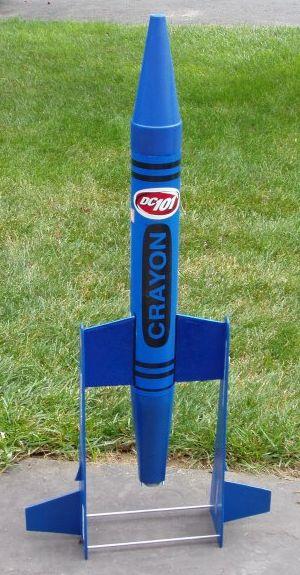
Brief:
This crayon bank rocket was obviously motivated by the
SpaceShipOne,
but is not anywhere close to scale. It is also my MonsterROC entry and flies on
38mm H motors.
Construction:
The major components/materials include:
- 4" diameter bank (now produced by Fantazia Marketing)
- 3/16" Luan plywood
- 1/4" tubular Kevlar®
- 38mm LOC motor tube
- 38mm-4" and 38mm-2" LOC centering rings
- 4" bulkplate with eye bolt
- buttons from railbutton.com
- 4" mailing tube
- miscellaneous hardware
- lead shot
- 2-part foam
- 2-part PC-7 epoxy paste
- 5 minute epoxy
- blue laser contact paper
- full page Avery labels
- Testor's clear coat
- muffler patch kit
My original concept was to make the entire body, including the tail cone, from a crayon bank. I got this idea from some of the U.S. Rockets (USR) builds reviewed on EMRR and The Rocketry Forum (TRF). At the time, the banks were not available locally, so I decided to practice making a tail cone from a piece of mailing tube (actually the telescoping inside tube). In this process, you cut out sections of the tube (roughly triangular, ignoring the curvature of the tube) and rejoin the remaining pieces. The more sections you remove, the closer the resulting structure will resemble a true cone. In my case, I only cut out four sections, resulting in a roughly rectangular end. I suggest you read the USR EMRR reviews for more details about making transitions and tail cones from body tubes. I'm not an expert and I did this a while ago.
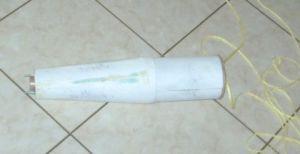 This cone
sat around for months until my local Toys'R'Us again started carrying the
banks. As I pondered chopping up the bank, I noticed that the test item was
almost exactly the same diameter. I couldn't bring myself to risk damaging the
bank, so I decided to use my test cone. This would result in a much longer than
scale rocket, but how scale was it going to be anyway? I also thought it would
be nice to cut back on the required nose weight.
This cone
sat around for months until my local Toys'R'Us again started carrying the
banks. As I pondered chopping up the bank, I noticed that the test item was
almost exactly the same diameter. I couldn't bring myself to risk damaging the
bank, so I decided to use my test cone. This would result in a much longer than
scale rocket, but how scale was it going to be anyway? I also thought it would
be nice to cut back on the required nose weight.
The motor mount is ~16" of LOC 38mm tubing. I have a 4" CR at the top (sanded down a bit) and a 3" ring part way down in the tail cone. A homemade coupler is mounted between the tail cone and the top ring. For motor retention, I epoxied two bolts to the rear of the motor tube. A nut serves as a spacer to keep the bolts parallel with the tube. I also added a couple of wraps of fiberglass around the end in between the head of the bolt and the nut. These seem to be solid. The 1/4" Kevlar® shock tether is mounted through the top ring, completing the motor mount assembly.
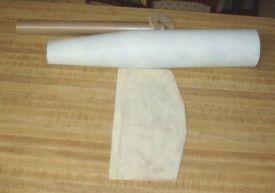
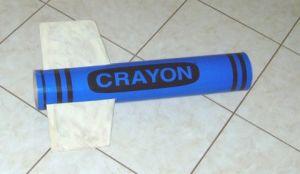
When the long fins were attached, I was surprised at how flexible they were. I thought about glassing them, but instead decided some support in the back was in order. I pondered more Luan, Lexan strips, etc. but decided on an aluminum rod for the side closest to the motor and a dowel for the other. This mix was again partially driven by what I had on hand. I also covered the aluminum rod, which is closer to the axis of the motor, with a heat resistant muffler patch kit. This turned out ugly and I may remove it later.
I knew I was going to need a lot of nose weight on this baby. My nose cone design started with a 4" bulkplate with an eyebolt mounted on it. This plate rests where the cone begins tapering forward. A piece of all-thread extends from the bulk plate to close to the tip of the cone. A washer is mounted on this all-thread about half way down. I planned to add lead shot and 2-part foam through the crayon tips coin slot. Thus, the washer would become embedded in the lead/foam slurry, locking the resulting plug to the bulkhead. The bulk plate assembly and a 2-layer cardboard shoulder are attached to the plastic cone with PC-7 epoxy paste.
I ran a RockSim model to approximate the CG and added nose weight to get the CG where I wanted it. I think I was quite conservative, producing a static margin of over 2 with the H144 loaded.
Finishing:
The crayon bank was blue, so I stuck with blue throughout. (I wanted a white
one, but you sometimes take what you can get.) The tail cone and side wings
were painted with Krylon and the main wings were covered with blue laser
contact paper.
The stickers were added after I decided to make this an entry in EMRR's MonsterROC contest. The majority, other than the US flags, the MDRA logo, and the DC101 sticker (a local rock station), were merely printed on full page Avery labels using my OfficeJet printer.
The homemade stickers include: CrayShipOne logos, logos for EMRR and TRF, my blog address, and vendor logos for Loki, Performance Hobbies, LOC/Precision, railbuttons.com, Giant Leap, Home Depot, and Michael's. This covers most of the materials used in the making of the rocket. I protected these with two coats of clear coat before application and one after.


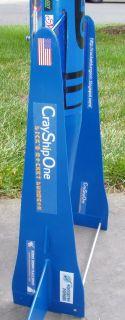
Flight:
This rocket uses separate chutes for the heavy cone and the body. I attached a
chute protector to the body's shock tether and used a large 60" chute.
This was packed into the nose cone shoulder. A 42" chute was attached to
the cone's shock tether and was packed in the body.
Since the model is heavy and was unproven, I made sure that the launch rail was pointed away from the flight line just in case. The boost was great (launch photos courtesy of Vertical Force Rocketry), however, ejection was very late.
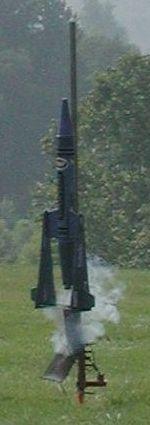
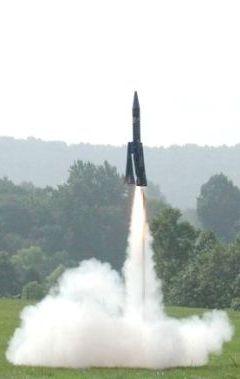
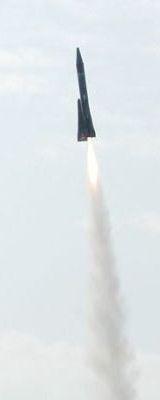
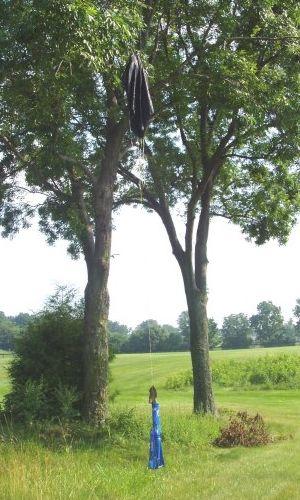
Recovery:
The main chute opened just fine but the cone's chute never opened. The cone was
recovered undamaged. When I approached the body, it looked like it had landed
standing up on end. On closer inspection, it was dangling about 6" from
the ground from a tall tree branch. A light tug dislodged the chute. This was
an interesting and successful recovery, but it didn't prove whether my fin
braces worked.
Summary:
I love crayon banks--they are about the cheapest 4" cone and body tube you
can find and are quite sturdy. This rocket turned out looking and flying
nicely. This design definitely stands-out in a crowd. The two issues are the
heavy nose and the floppy fins. If anyone else builds something like this,
better wood and some fiberglass would be a good idea. Giant Leap honeycomb
composites would be cool, but expensive.
 |
 |